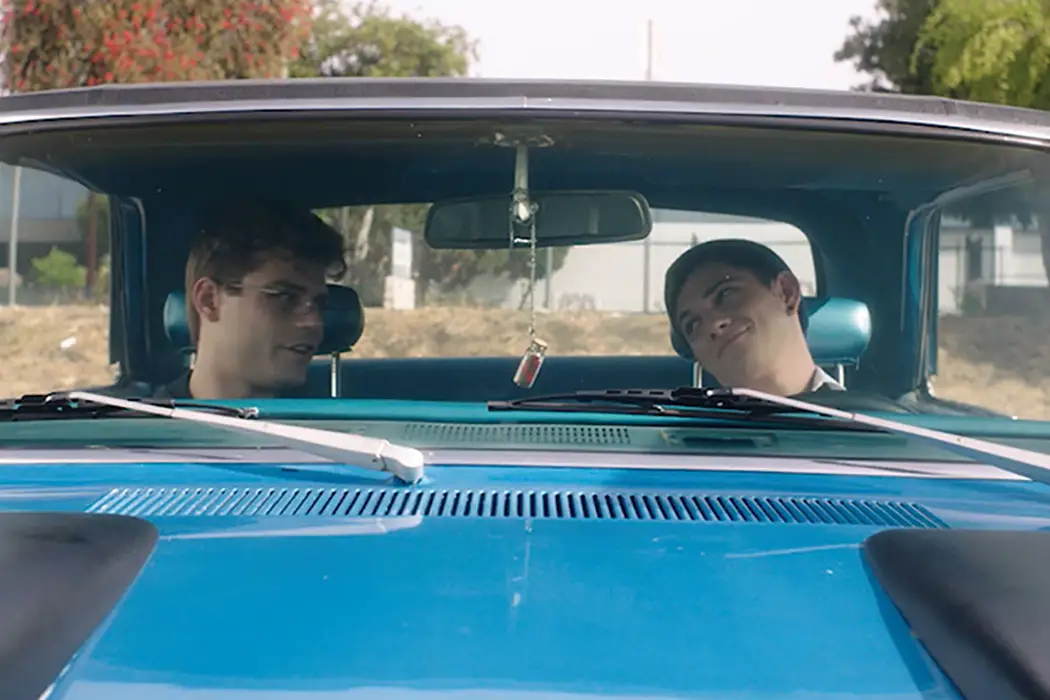REACH: A Thoroughly Teen Movie

Eric D. Bernasek lives on the island just north of…
Reach is the first feature-film for director Leif Rokesh and writers Maria Capp, Johnny James Fiore, and Grant Harling. It concerns the acute adolescent distress of one Steven Turano (Garrett Clayton) – who begins the film by introducing himself and announcing to the viewers that “…Tonight I’m going to kill myself” – and a free-ish spirit named Clarence West (also Johnny James Fiore), who has newly arrived at Reach Performing Arts Academy and just might be enough to derail Steven’s plans.
Though Steven is the character who’s made to grow and change, Clarence is the focus of attention, for the viewer and for Steven. Among teenagers, Clarence is uncommonly, perhaps suspiciously, self-assured. Steven’s assessment is that Clarence “seems to have it figured out,” whatever “it” might be. Speaking practically, Clarence is an inexplicable blend of the unearned confidence of fictional Pawnee, Indiana’s Jean-Ralphio (Ben Schwartz) and the daringly less than stereotypically masculine fashion sense of Pretty in Pink’s Duckie (Jon Cryer) or of Rickie Vasquez (Wilson Cruz) from My So-Called Life.
Clarence West is a sort of romantically neutral manic pixie dream boy, but less captivating. He will try and largely succeed to draw Steven out of his depression, despite the fact that he’s contending with Serious Teen Problems of his own. But, really, who isn’t? Nearly every character in Reach has some tragic backstory that bursts into the narrative in order to illuminate Why They Are The Way They Are. To be fair, four of these stories (at least) are all a part of the same not-so-epic tale. Still, to be honest, in no case do these sad narratives actually animate their otherwise flat and dimensionless characters.
Juvenile Delinquency… Its Causes… And Its Effects…
The thread that connects Steven and his emotionally abusive father, Steve (Bojesse Christopher), to Steven’s bully, Nick (Jordan Doww), and his physically abusive father, Jack (Kevin Sizemore), is relentlessly rethreaded into the present tense narrative as a dour, half-speed flashback with dialogue replaced by excessively foreboding music. It’s clear, almost immediately, what happened and why everyone is so upset about it, but the movie keeps revisiting the same old trauma, as if revealing something new and important each time.

This type of miscalculation is typical of Reach, in which the audience is told and shown and told again about things that are more or less self-evident, and which never end up feeling as significant as they probably should. There’s a melodrama-induced fatigue that affects all these tragic stories, making it difficult to really care about any one of them. This is, after all, a movie that explicitly tells you, in its first thirty seconds, that it will be concerned with suicide and then in short order takes on depression, bullying, social media, orphanhood, alcoholism, homophobia, domestic violence, drug abuse, and school gun violence for good measure.
These topics are not different facets of the same story but in many cases come up as the main subject in separate but related stories. Unfortunately, no one subject is treated with much depth or sensitivity, occurring instead as little more than individual plot points in the movie’s sprawling psychodrama. To its credit, Reach could have been a modern version of a juvenile delinquency obsessed “message film” from the 1950s, like High School Confidential! or Blackboard Jungle, if it had narrowed its focus on one or two or even three of these ideas and tried to say something, anything substantial about “its causes… and its effects.”
Reach: Teen Movie
Given its clear desire to say something urgent about urgent things – given, that is, its sincerity – it’s hard to completely dismiss Reach. It’s not that what the movie wants to talk about is unimportant, it’s more that it hasn’t quite figured out what it wants to say or how to say it. In that sense, at least, Reach is a thoroughly teen movie – its maturity and proficiency are outstripped by its desire and ambition.
What do you expect from a teen movie?
Reach had its theatrical release in the US on October 19, 2018.
Does content like this matter to you?
Become a Member and support film journalism. Unlock access to all of Film Inquiry`s great articles. Join a community of like-minded readers who are passionate about cinema - get access to our private members Network, give back to independent filmmakers, and more.
Eric D. Bernasek lives on the island just north of the island that is Montreal. He thinks too much and writes too little. He is currently working on a book about movies from your childhood: "Does Barry Manilow know that you raid his wardrobe?" – Authority and Rebellion in Movies About High School.













